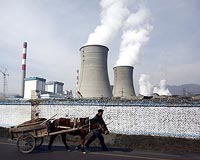| . |  |
. |
Geneva (AFP) Sept 1, 2009 Developing nations need a 600-billion-dollar "Marshall Plan" annually to tackle climate change with support from rich nations on a scale not seen outside wartime recovery, a UN report said Tuesday. The World Economic and Social Survey called for a "Global Sustainable New Deal" to overcome the "woefully inadequate" estimate of 21 billion dollars currently set aside internationally to adapt to and cope with climate change. Touching on a core stumbling block in global climate talks, the report said that poor nations needed a huge investment programme from rich nations to shift to clean energy, and to adapt to the weather changes and damage wrought by global warming. The transformation would require "a level of international support and solidarity rarely mustered outside a wartime setting," according to the survey by the UN's department of economic and social affairs. "What we're arguing for given the kind of money we're talking about is a new Marshall Plan to tackle climate change and development," said author Richard Kozul-Wright. "The ballpark figure in this report is one percent of world GDP, something in the order currently of 500 billion to 600 billion dollars (419 billion euros) annually is what developing countries will need in terms of international support to make this kind of shift sooner rather than later," the UN economist told journalists. World leaders will meet in the Danish capital Copenhagen in December in a bid to seal a new international accord against climate change, aimed primarily at setting new emissions cuts and drawing developing nations into the deal. But industralised, emerging and developing nations are at loggerheads in the negotiations, including over the issue of additional funding to help poor countries mitigate and adapt to global warming. The latest UN figure is well above previous estimates. "The kind of adjustments required have been seriously underestimated," said Kozul-Wright, calling for more "leadership" from high polluting rich nations and "much more frank and open discussions about burden sharing at the international level." The report acknowledged that the required public investment push for climate action was "substantial and daunting," but pointed to the trillion dollar support given to banks and the financial system over the past year. "This is a systemic threat," said the senior UN economist. The report warned that incremental, market-based solutions such as emissions trading were not enough. Instead they needed to find a way to pursue high economic growth as well as low emissions simultaneously, rather than to stifle industrial activity in order to cut energy use. Investment within the next decade followed by rapid growth would sustain a wholesale transition to clean energy in poor nations and gradually help them to stand alone in coping with changing weather patterns, it added. The report endorsed by UN Secretary General Ban Ki-moon said: "The idea of freezing the current level of global inequality over the next half century or more, as the world goes about trying to solve the climate problem, is economically, politically and ethically unacceptable." It pointed out that while the world needed to cut greenhouse gas emissions by 50 to 80 percent over 1990 levels by 2050, the energy generating capacity of developing countries was projected to be double that of their developed counterparts. The report firmly laid the burden for current cuts on wealthy nations, noting that carbon emissions from China's booming economy were equivalent to those of the United States before World War I. Share This Article With Planet Earth
Related Links Climate Science News - Modeling, Mitigation Adaptation
 Walker's World: Climate and China
Walker's World: Climate and ChinaLondon (UPI) Aug 31, 2009 Alarmed that the Obama administration is losing momentum, the European Union is preparing a high-level lobbying effort in Washington to push for a strong U.S. commitment to prevent failure at this year's international conference on climate change. The U.N. conference in Copenhagen, Denmark, is supposed to agree the replacement of the Kyoto Protocol and restrain carbon dioxide emissions. ... read more |
|
| The content herein, unless otherwise known to be public domain, are Copyright 1995-2009 - SpaceDaily. AFP and UPI Wire Stories are copyright Agence France-Presse and United Press International. ESA Portal Reports are copyright European Space Agency. All NASA sourced material is public domain. Additional copyrights may apply in whole or part to other bona fide parties. Advertising does not imply endorsement,agreement or approval of any opinions, statements or information provided by SpaceDaily on any Web page published or hosted by SpaceDaily. Privacy Statement |